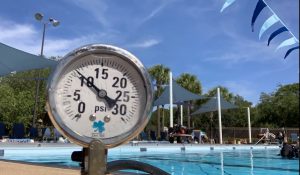Maintaining a pool involves more than just keeping the water clean and clear; it also requires safeguarding the structural integrity of the pool itself. Pressure testing is a crucial aspect of pool maintenance that ensures the integrity of the pool’s plumbing system, helping to detect leaks and prevent potential damage. In this article, we’ll delve into the importance of pressure testing pools and why it should be a regular part of every pool owner’s maintenance routine.
Bradenton Pool Leak Repair
One of the primary reasons pressure testing is essential for pools is its effectiveness in detecting hidden leaks. Even small leaks in the pool’s plumbing system can lead to significant water loss over time. By pressurizing the plumbing lines and monitoring for drops in pressure, pressure testing can pinpoint the location of leaks that may otherwise go unnoticed. Identifying and repairing these leaks promptly helps prevent water waste and costly damage to the pool and surrounding areas.
Bradenton Pool Plumbing Testing
Leaks in a pool’s plumbing system can not only lead to water loss but also cause damage to the pool’s structure. When water leaks into the surrounding soil, it can erode the ground, leading to shifting or settling of the pool’s foundation. Over time, this can result in cracks in the pool shell, tilting of the pool deck, and other structural issues. Pressure testing helps identify leaks early, preventing potential structural damage and saving pool owners from costly repairs. A properly pressurized plumbing system is essential for the efficient operation of pool equipment such as pumps, filters, and heaters. Leaks in the plumbing lines can disrupt water flow and pressure, reducing the effectiveness of these essential components. By conducting regular pressure testing, pool owners can ensure that their equipment operates at peak efficiency, minimizing energy consumption and extending the lifespan of pool equipment.
Plumbing testing is not only beneficial for maintaining pool functionality but also essential for ensuring compliance with safety standards and regulations. Many municipalities require pressure testing as part of the pool construction or renovation process to verify the integrity of the plumbing system. Regular pressure testing helps pool owners meet these requirements and provides peace of mind knowing that their pool is safe and compliant. Incorporating plumbing tests into a regular pool maintenance schedule is a proactive approach to preserving the longevity and functionality of the pool. By identifying and addressing potential issues early, pool owners can prevent costly repairs and downtime, ensuring that their pool remains a source of enjoyment for years to come.
In conclusion, pressure testing is a vital aspect of pool maintenance that helps detect leaks, prevent structural damage, ensure equipment efficiency, and maintain compliance with safety standards. Pool owners should prioritize regular pressure testing as part of their maintenance routine to safeguard their investment and enjoy a trouble-free pool experience.


Recent Comments